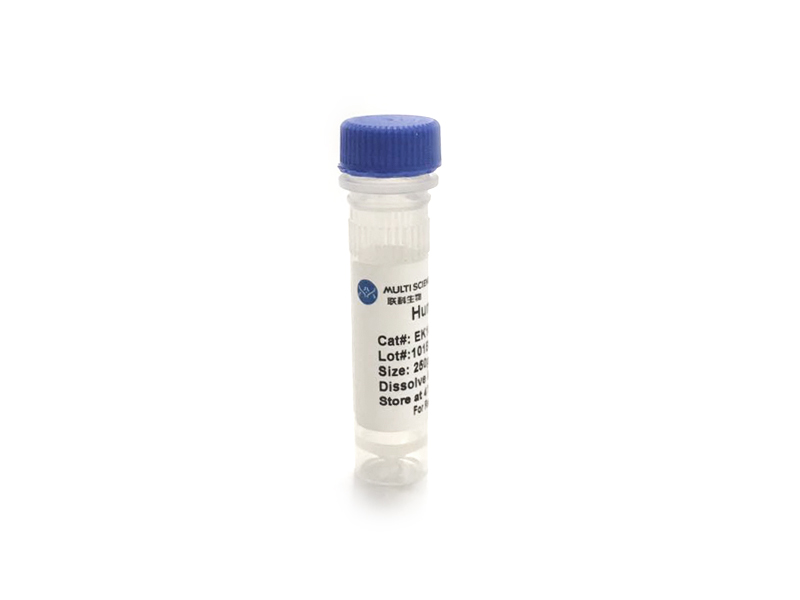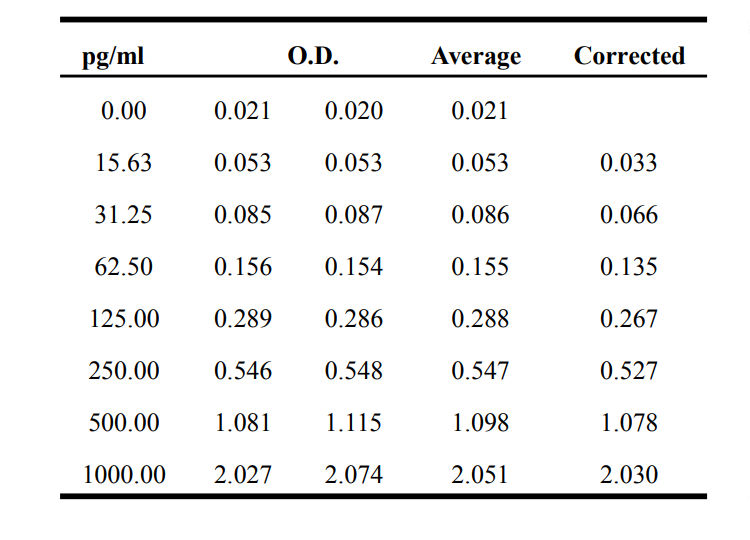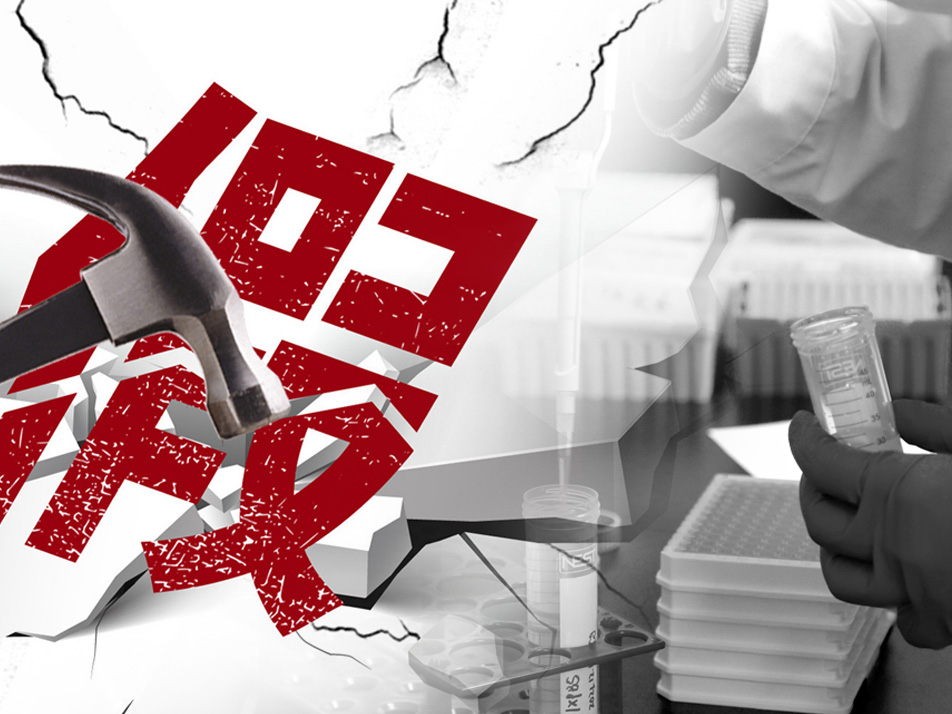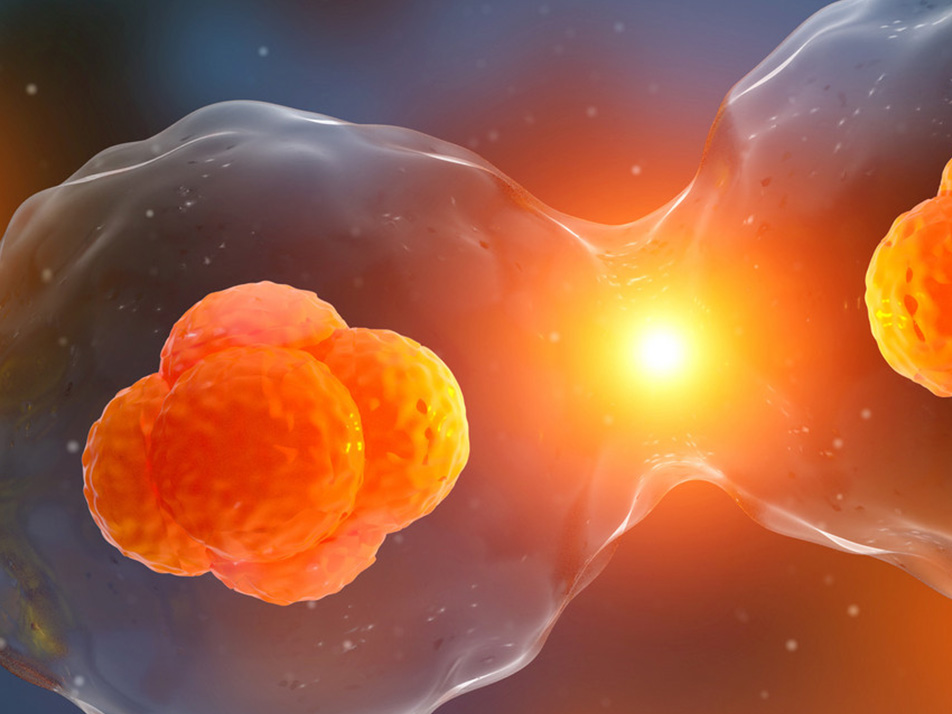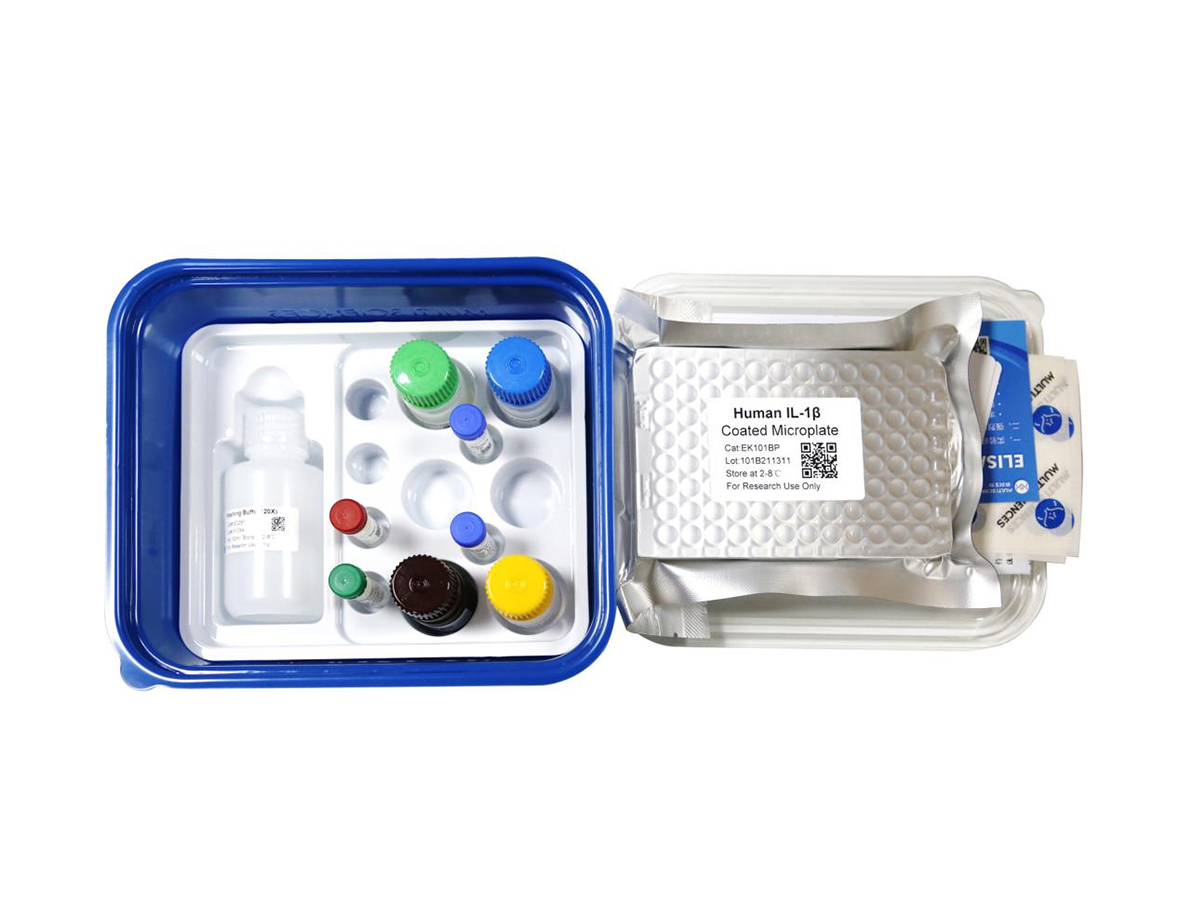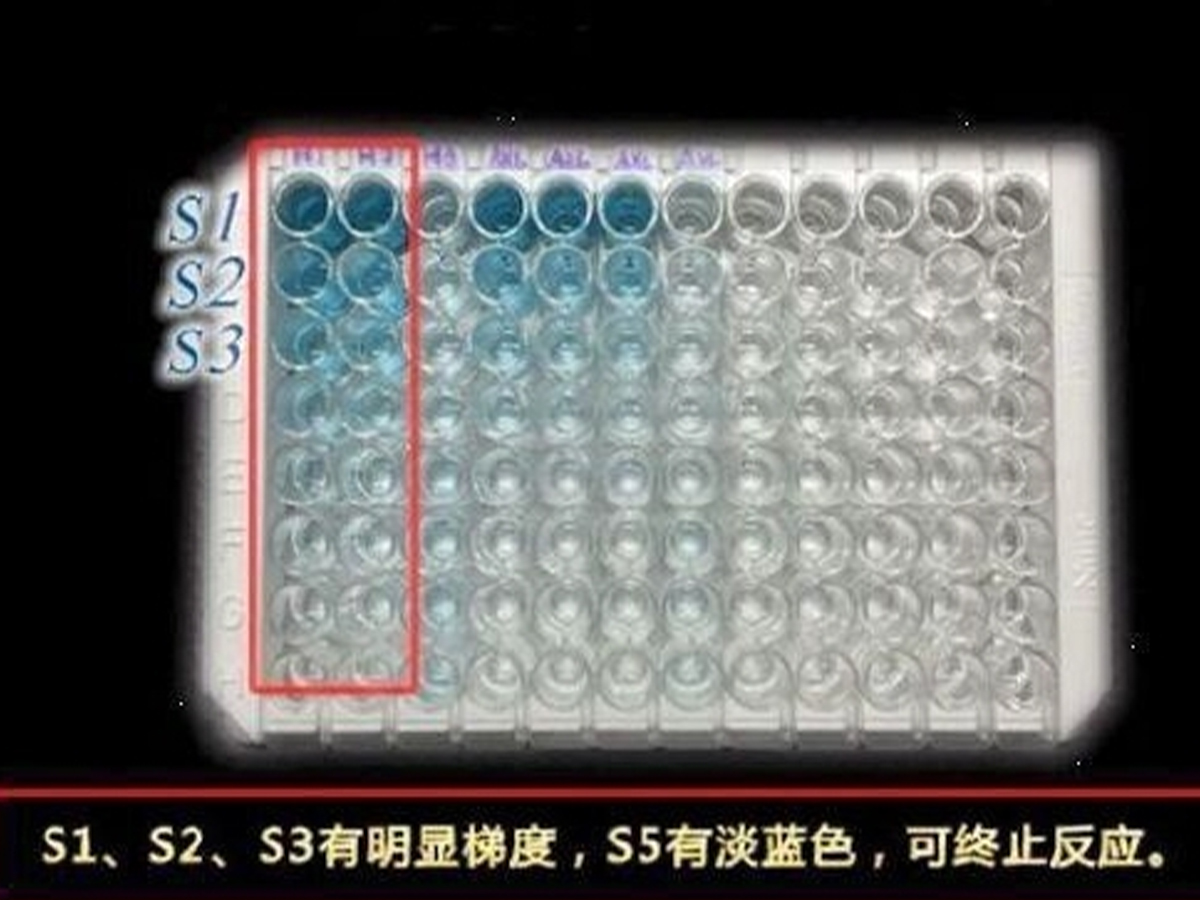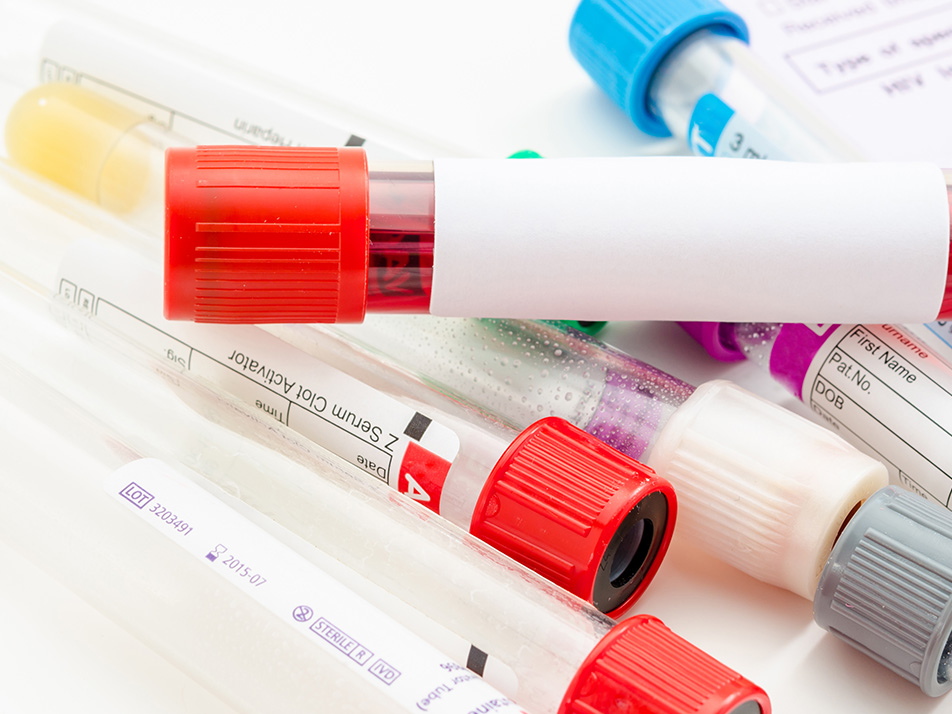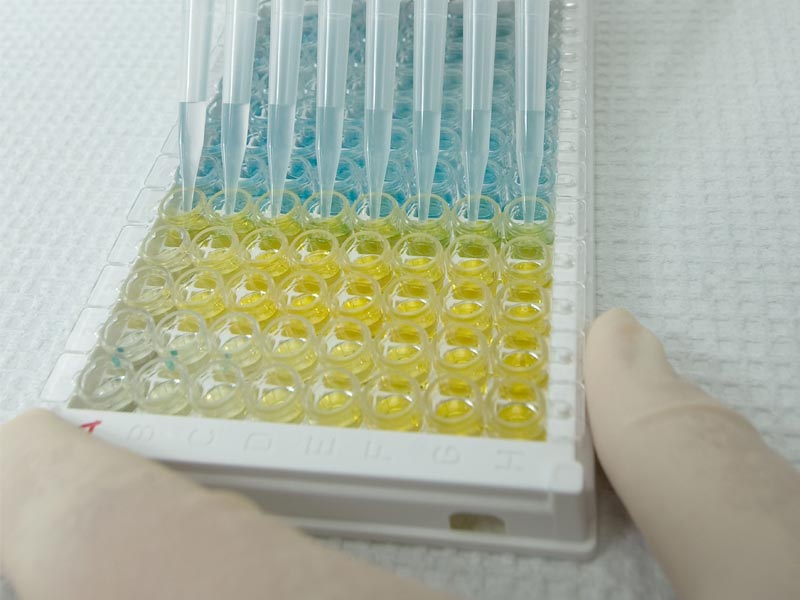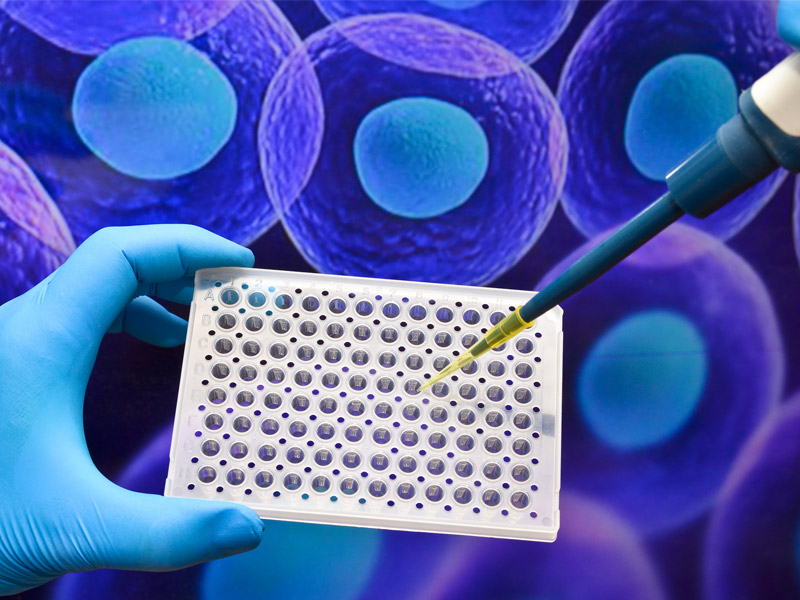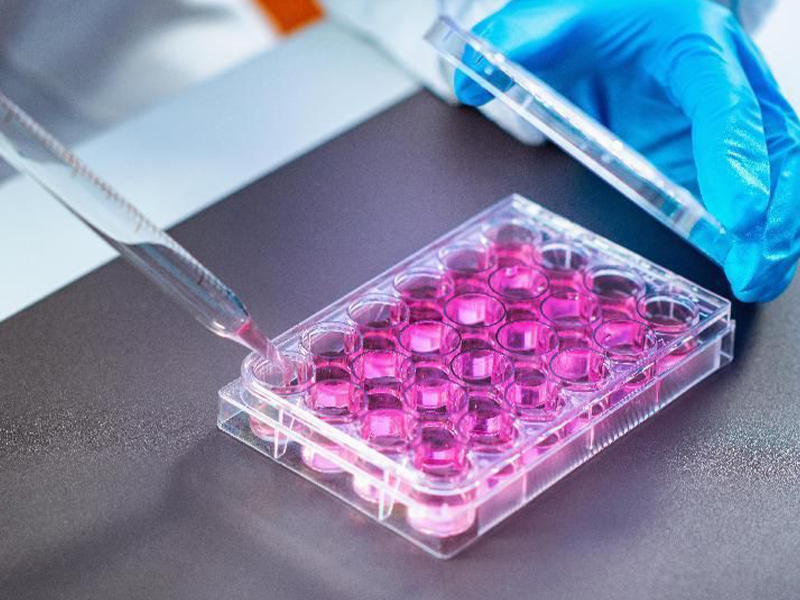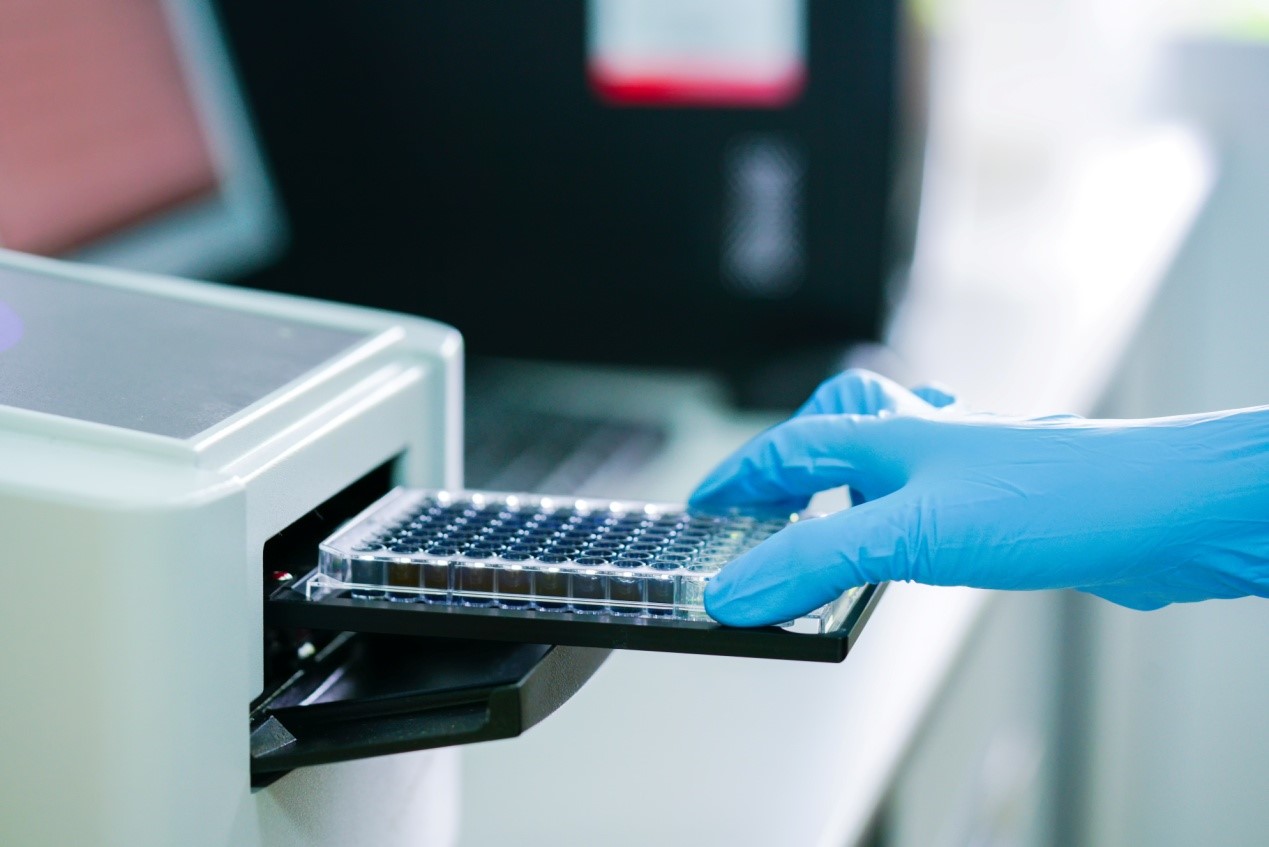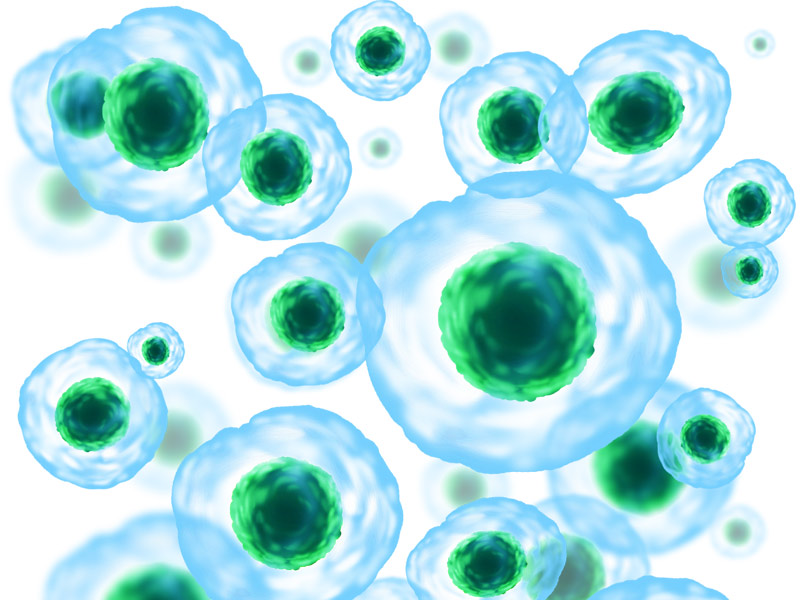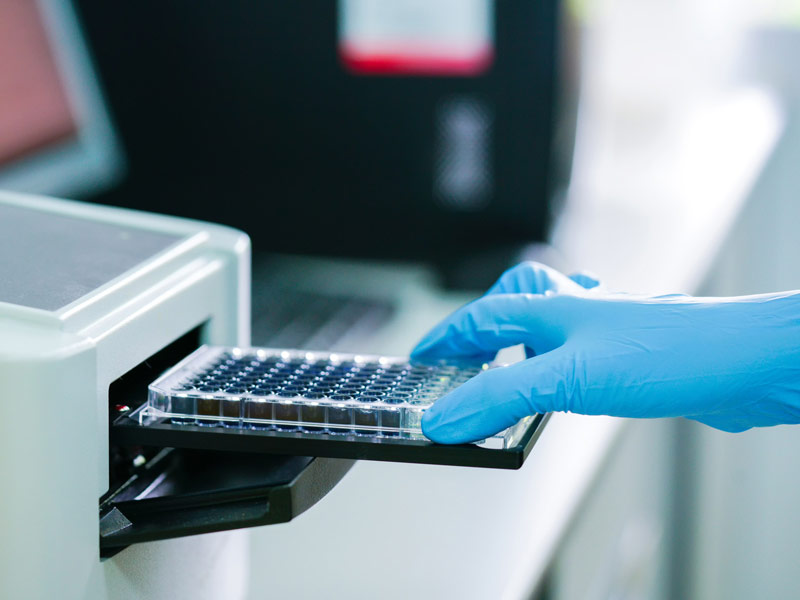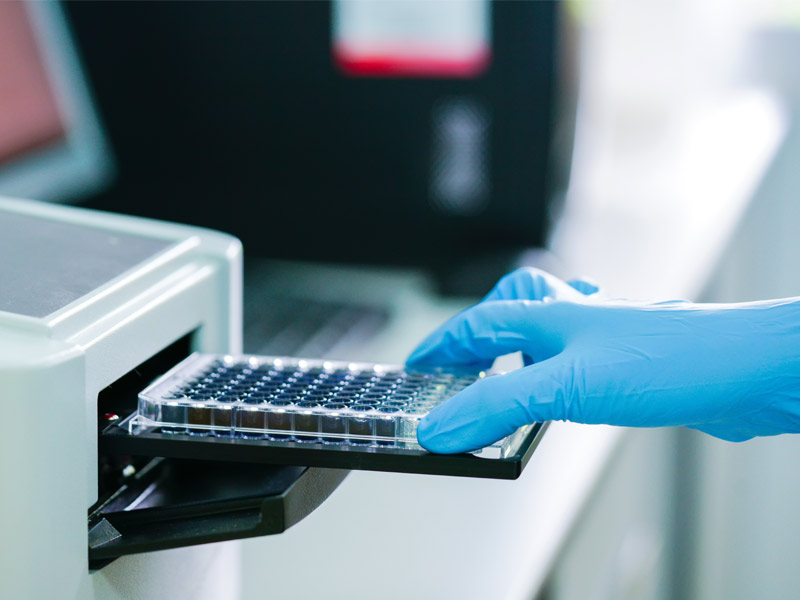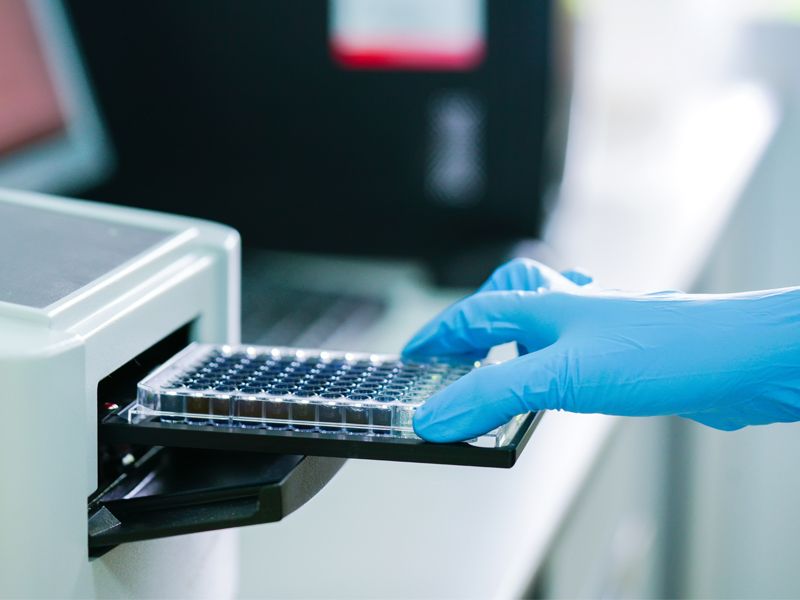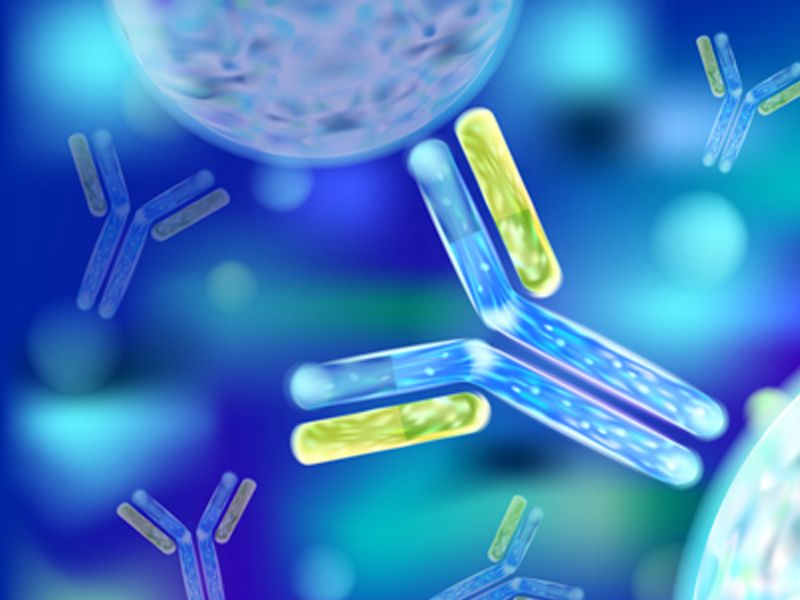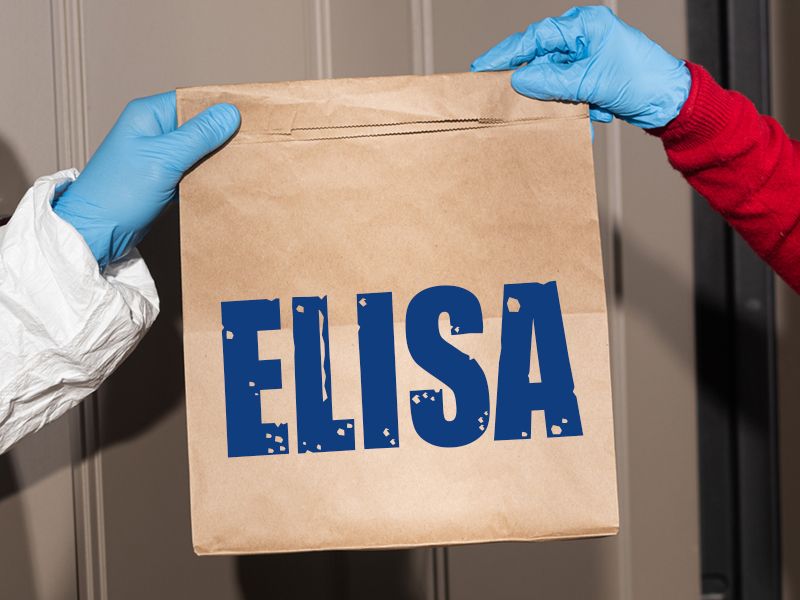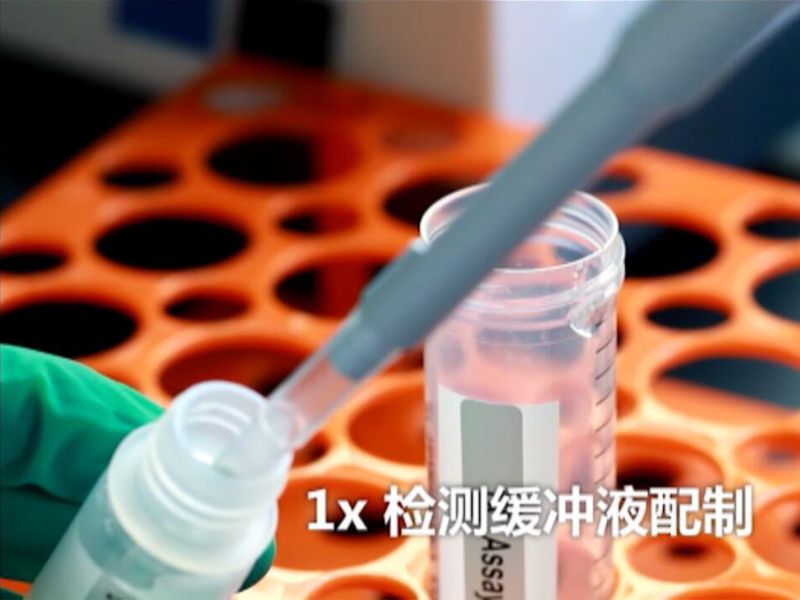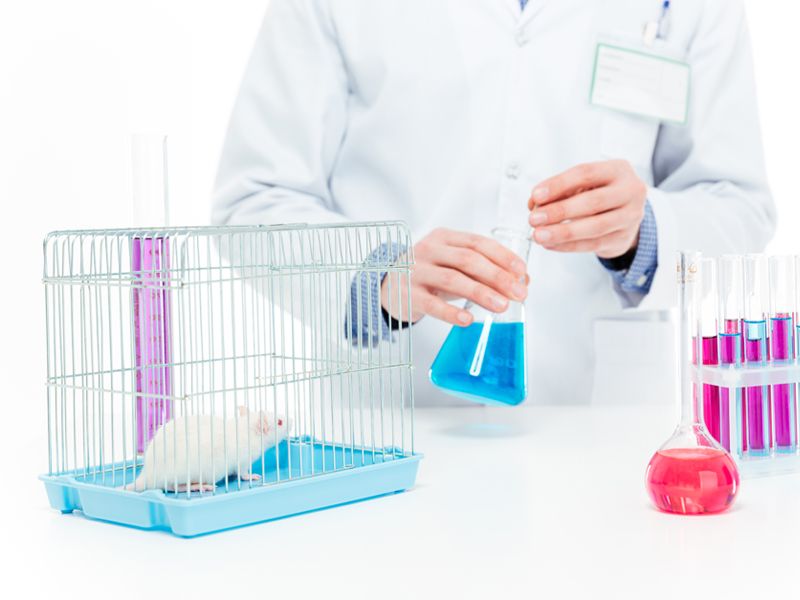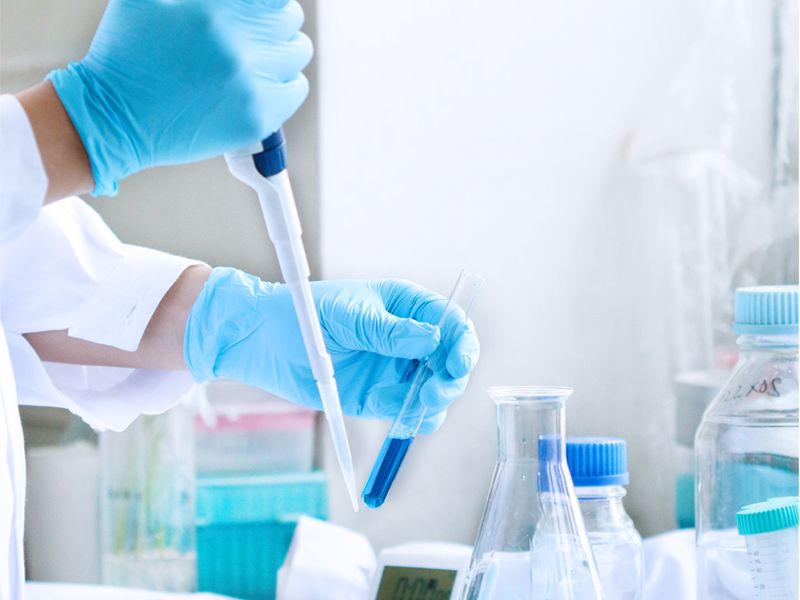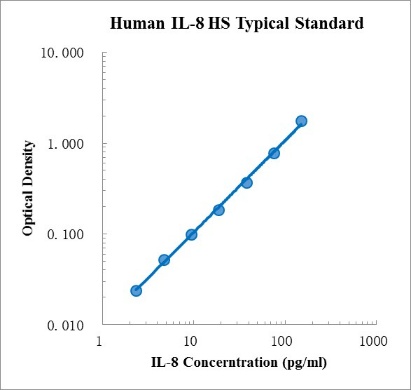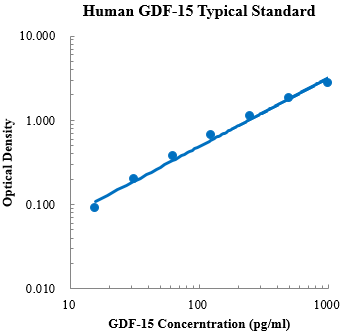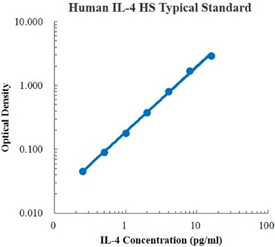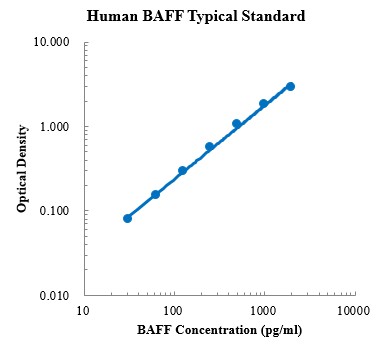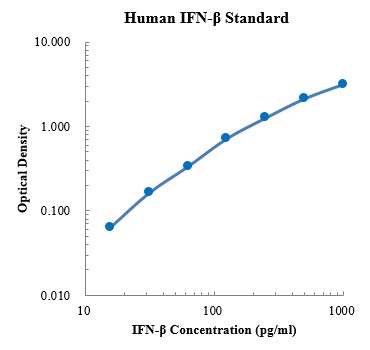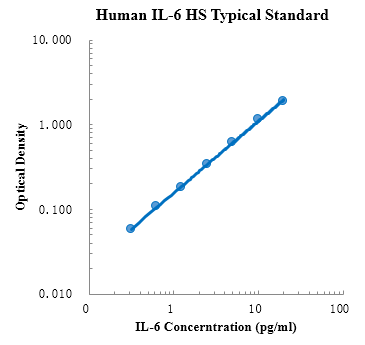Mouse IFN-β Standard (小鼠IFN-β 标准品)
¥280.00
描述
文章目录[隐藏]
本产品只包含标准品试剂,如需购买试剂盒请点击下图
-
- EK2236 54 Citations
- ELISA试剂盒
Mouse IFN-β ELISA Kit检测试剂盒(酶联免疫吸附法)
- ¥2,000.00 – ¥10,800.00
| 商品名 |
Mouse IFN-β Standard (小鼠IFN-β 标准品) |
|---|---|
| 组分 |
Mouse IFN-β冻干标准品 |
| 检测方法 |
双抗夹心法 |
| 样本类型 |
血清,血浆,细胞培养上清及其他生物学样本 |
| 板式 |
管 |
| 保存 |
短期4℃,长期-20℃保存 |
| 运输条件 |
4℃蓝冰运输 |
检测原理:本试剂盒采用双抗体夹心酶联免疫吸附检测技术。特异性抗小鼠IFN-β抗体预包被在高亲和力的酶标板上。酶标板孔中加入标准品、检测样本和辣根过氧化物酶标记的检测抗体,经过孵育,样本中存在的IFN-β与固相抗体和检测抗体结合。洗涤后,加入显色底物TMB,避光显色。颜色反应的深浅与样本中IFN-β的浓度成正比。加入终止液终止反应,在450 nm波长(参考波长570 - 630 nm)测定吸光度值。
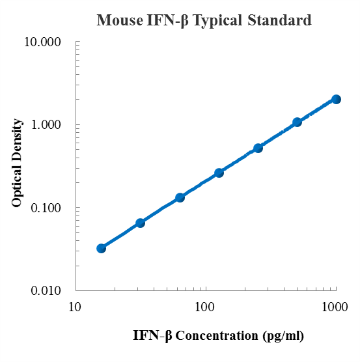
分子信息
IFNB1 分子靶点信息概述
- 分子名:IFNB1, interferon beta 1
- 基因家族:Interferons
- 别名:IFB; IFF
- 曾用名:IFNB
- 全称:interferon, beta 1, fibroblast
IFNB1 分子靶点综述
干扰素(IFNs)是宿主细胞在响应病原体(如病毒、细菌、寄生虫或者肿瘤细胞)时合成和释放的一组信号蛋白。在通常情况下,病毒感染的细胞会释放干扰素,使周围的细胞提高其抗病毒防御能力。基于受体类型,人类干扰素可分为3大类型:I型干扰素,包括IFN-α、IFN-β、IFN-ε、IFN-κ和IFN-ω,II型干扰素(在人类中称为IFN-γ)和III型干扰素。IFN-β通过信号通路STAT1和STAT2上调和下调多种基因,其中,大部分基因参与抗病毒免疫反应。IFN-β在诱导广泛的非特异性抗病毒感染中起重要作用,它还影响细胞增殖并调节免疫应答。
小鼠 Mouse Ifnb1 分子靶点信息
- 分子名:Ifnb1, interferon beta 1, fibroblast
- 别称:
- Ifb
- IFN-beta
- IFNB
- 基因序列:NCBI_Gene: 15977
- 蛋白序列:
小鼠 Mouse Ifnb1 靶点分子功能(预测)
Enables cytokine activity and type I interferon receptor binding activity. Involved in B cell proliferation; cellular response to virus; and type I interferon signaling pathway. Acts upstream of or within several processes, including cellular response to organic cyclic compound; defense response to other organism; and negative regulation of osteoclast differentiation. Located in extracellular space. Is expressed in embryo and liver. Human ortholog(s) of this gene implicated in COVID-19. Orthologous to human IFNB1 (interferon beta 1).
引用文献统计
该产品被引用的文献总数为:0
暂无相关文献引用。
ELISA标准品操作常见问题查看更多ELISA标准品操作步骤技术文章
查看更多ELISA标准品操作步骤技术文章
操作步骤
文章目录[隐藏]
- ELISA操作常见问题
- 小心!你的 ELISA 试剂盒可能是假的
- 开学学习计划,如何收集ELISA检测样本——细胞
- 开学学习计划,如何选择ELISA试剂盒
- 开学学习计划,ELISA从新手到入门!
- 一文掌握ELISA实验显色判断、数据分析及标曲拟合
- 血清OR血浆,哪个是ELISA的菜
- ELISA通关必备丨数据篇丨标准曲线不佳
- ELISA通关必备丨操作篇丨常见问题及解决方案
- ELISA通关必备丨操作篇丨溶解与稀释标准品
- ELISA通关必备丨样本篇丨不常见样本
- ELISA通关必备丨样本篇丨常见样本丨细胞
- ELISA通关必备丨如何选择试剂盒
- ELISA通关必备丨基础知识
- 真?假?ELISA试剂盒选择要小心
- ELISA常见类型一 | 双抗夹心法,你要的都在这里!
- ELISA常见类型二 | 竞争法,五分钟搞定!
- 叮!联科向您投递了个ELISA实验操作干货包,请查收~
- 【视频】ELISA实验操作步骤演示视频教程
- ELISA 组织样本的处理—大鼠组织
- 【视频】ELISA实验原理与常见问题分析
- 查看更多ELISA操作相关问题
ELISA操作常见问题
查看更多ELISA操作相关问题
引用文献
文章目录[隐藏]
- A Network Pharmacology-Based Investigation to the Pharmacodynamic Material Basis and Mechanisms of the Anti-Inflammatory and Anti-Viral Effect of Isatis indigotica
- Tanreqing Inhibits LPS-Induced Acute Lung Injury In Vivo and In Vitro Through Downregulating STING Signaling Pathway
- Anti-influenza A virus mechanism of three representative compounds from Flos Trollii via TLRs signaling pathways
- Simultaneous innate immunity activation and immunosuppression improvement by biodegradable nanoplatform for boosting antitumor chemo-immunotherapy
- Irradiation combined with PD-L1−/− and autophagy inhibition enhances the antitumor effect of lung cancer via cGAS-STING-mediated T cell activation
- Multifunctional biomimetic nanoplatform based on photodynamic therapy and DNA repair intervention for the synergistic treatment of breast cancer
- Toxoplasma gondii ROP18I inhibits host innate immunity through cGAS-STING signaling
- In-situ self-assembled vaccine constructed with dual switchable nanotransformer for tumor immunotherapy
- PreS/2-21-Guided siRNA Nanoparticles Target to Inhibit Hepatitis B Virus Infection and Replication.
- Herpesvirus-Mimicking DNAzyme-Loaded Nanoparticles as a Mitochondrial DNA Stress Inducer to Activate Innate Immunity for Tumor Therapy
- Anlotinib enhances the antitumor immunity of radiotherapy by activating cGAS/STING in non-small cell lung cancer
- NLRP3 protects mice from radiation-induced colon and skin damage via attenuating cGAS-STING signaling
- Integrated manganese (III)-doped nanosystem for optimizing photothermal ablation: Amplifying hyperthermia-induced STING pathway and enhancing antitumor immunity
- Efficient Delivery of Chlorin e6 by Polyglycerol-Coated Iron Oxide Nanoparticles with Conjugated Doxorubicin for Enhanced Photodynamic Therapy of Melanoma
- SHP2-Mediated Inhibition of DNA Repair Contributes to cGAS–STING Activation and Chemotherapeutic Sensitivity in Colon Cancer
- Harnessing chlorin e6 loaded by functionalized iron oxide nanoparticles linked with glucose for target photodynamic therapy and improving of the immunogenicity of lung cancer
- Activating cGAS-STING pathway with ROS-responsive nanoparticles delivering a hybrid prodrug for enhanced chemo-immunotherapy
- Oroxylin A regulates cGAS DNA hypermethylation induced by methionine metabolism to promote HSC senescence
- Allosteric inhibition reveals SHP2-mediated tumor immunosuppression in colon cancer by single-cell transcriptomics
- Hybrid nanoparticle–mediated simultaneous ROS scavenging and STING activation improve the antitumor immunity of in situ vaccines
- Targeted Delivery of STING Agonist via Albumin Nanoreactor Boosts Immunotherapeutic Efficacy against Aggressive Cancers
- 2D Differential Metallic Immunopotentiators Drive High Diversity and Capability of Antigen-specific Immunity Against Tumor
- She-Chuang-Si-Wu-Tang Alleviates Inflammation and Itching Symptoms in a Psoriasis Mouse Model by Regulating the Th17/IL-17 Axis via the STAT3/MAPK Pathways
- Loss of Nrf2 aggravates ionizing radiation-induced intestinal injury by inhibiting the cGAS/STING pathway via Pirin
- Loss of Annexin A1 in macrophages restrains efferocytosis and remodels immune microenvironment in pancreatic cancer by activating the cGAS/STING pathway
- A polymeric nanoplatform enhances the cGAS-STING pathway in macrophages to potentiate phagocytosis for cancer immunotherapy
- Neopterin mediates sleep deprivation-induced microglial activation resulting in neuronal damage by affecting YY1/HDAC1/TOP1/IL-6 signaling
- Chronological Management of Adjuvant Effect for Optimized mRNA Vaccine Inspired by Natural Virus Infection
- Self-modifying NanoEnhancers facilitating lysosomal escape for cGAS-STING cascading activation in tumor immunotherapy
- Engineered low-pathogenic Helicobacter pylori as orally tumor immunomodulators for the stimulation of systemic immune response
- Total glucosides of paeony alleviates cGAS-STING-mediated diseases by blocking the STING-IRF3 interaction
- Peroxidase-Like Nanozyme Activates the cGAS-STING Pathway via ROS-Induced mtDNA Release for Cancer Immunotherapy
- Ginsenoside Rb1 mitigates acute catecholamine surge-induced myocardial injuries in part by suppressing STING-mediated macrophage activation
- Pseudorabies virus usurps non-muscle myosin heavy chain IIA to dampen viral DNA recognition by cGAS for antagonism of host antiviral innate immunity
- Viperin inhibits interferon-γ production to promote Mycobacterium tuberculosis survival by disrupting TBK1-IKKε-IRF3-axis and JAK-STAT signaling
- Dual deficiency of melatonin and dihydrotestosterone promotes stromal cell damage and mediates prostatitis via the cGAS-STING pathway in sleep-deprived mice
- Sequential administration of delta-tocotrienol ameliorates radiation-induced myelosuppression in mice and non-human primates through inducing G-CSF production
- Luteolin-7-O-glucoside promotes macrophage release of IFN-β by maintaining mitochondrial function and corrects the disorder of glucose metabolism during RSV infection
- Echinococcus granulosus cyst fluid inhibits the type I interferon response by promoting ROS in macrophages
- Manganese@Albumin Nanocomplex and Its Assembled Nanowire Activate TLR4-Dependent Signaling Cascades of Macrophages
- Nuclear-Targeted Nanostrategy Regulates Spatiotemporal Communication for Dual Antitumor Immunity
- Ginsenoside Rg3 enriches SCFA-producing commensal bacteria to confer protection against enteric viral infection via the cGAS-STING-type I IFN axis
- High-Intensity Interval Training Ameliorates High-Fat Diet-Induced Metabolic Disorders via the Cyclic GMP-AMP Synthase-Stimulator of Interferon Gene Signaling Pathway
- Manganese ion gradient liposomes modified by disulfide bond enhance cellular uptake and tumor immunity
- Record-High Ultrasound-Sensitive NO Nanogenerators for Cascade Tumor Pyroptosis and Immunotherapy
- Gut microbial GABAergic signaling improves stress-associated innate immunity to respiratory viral infection
- Regulating T-cell metabolic reprogramming and blocking PD-1 co-promote personalized postoperative autologous nanovaccines
- Proteotranscriptomic analyses reveal distinct interferon-beta signaling pathways and therapeutic targets in choroidal neovascularization
- Chronic exposure to low-level lipopolysaccharide dampens influenza-mediated inflammatory response via A20 and PPAR network
- A polymeric nanoplatform enhances the cGAS-STING pathway in macrophages to potentiate phagocytosis for cancer immunotherapy
- A polymeric nanoplatform enhances the cGAS-STING pathway in macrophages to potentiate phagocytosis for cancer immunotherapy
- Multifunctional biomimetic nanoplatform based on photodynamic therapy and DNA repair intervention for the synergistic treatment of breast cancer
- A Network Pharmacology-Based Investigation to the Pharmacodynamic Material Basis and Mechanisms of the Anti-Inflammatory and Anti-Viral Effect of Isatis Indigotica
- Efficient Delivery of Chlorin E6 by Polyglycerol-Coated Iron Oxide Nanoparticles with Conjugated Doxorubicin for Enhanced Photodynamic Therapy of Melanoma
A Network Pharmacology-Based Investigation to the Pharmacodynamic Material Basis and Mechanisms of the Anti-Inflammatory and Anti-Viral Effect of Isatis indigotica
Tanreqing Inhibits LPS-Induced Acute Lung Injury In Vivo and In Vitro Through Downregulating STING Signaling Pathway
Anti-influenza A virus mechanism of three representative compounds from Flos Trollii via TLRs signaling pathways
Simultaneous innate immunity activation and immunosuppression improvement by biodegradable nanoplatform for boosting antitumor chemo-immunotherapy
Irradiation combined with PD-L1−/− and autophagy inhibition enhances the antitumor effect of lung cancer via cGAS-STING-mediated T cell activation
Multifunctional biomimetic nanoplatform based on photodynamic therapy and DNA repair intervention for the synergistic treatment of breast cancer
Toxoplasma gondii ROP18I inhibits host innate immunity through cGAS-STING signaling
In-situ self-assembled vaccine constructed with dual switchable nanotransformer for tumor immunotherapy
PreS/2-21-Guided siRNA Nanoparticles Target to Inhibit Hepatitis B Virus Infection and Replication.
Herpesvirus-Mimicking DNAzyme-Loaded Nanoparticles as a Mitochondrial DNA Stress Inducer to Activate Innate Immunity for Tumor Therapy
Anlotinib enhances the antitumor immunity of radiotherapy by activating cGAS/STING in non-small cell lung cancer
NLRP3 protects mice from radiation-induced colon and skin damage via attenuating cGAS-STING signaling
Integrated manganese (III)-doped nanosystem for optimizing photothermal ablation: Amplifying hyperthermia-induced STING pathway and enhancing antitumor immunity
Efficient Delivery of Chlorin e6 by Polyglycerol-Coated Iron Oxide Nanoparticles with Conjugated Doxorubicin for Enhanced Photodynamic Therapy of Melanoma
SHP2-Mediated Inhibition of DNA Repair Contributes to cGAS–STING Activation and Chemotherapeutic Sensitivity in Colon Cancer
Harnessing chlorin e6 loaded by functionalized iron oxide nanoparticles linked with glucose for target photodynamic therapy and improving of the immunogenicity of lung cancer
Activating cGAS-STING pathway with ROS-responsive nanoparticles delivering a hybrid prodrug for enhanced chemo-immunotherapy
Oroxylin A regulates cGAS DNA hypermethylation induced by methionine metabolism to promote HSC senescence
Allosteric inhibition reveals SHP2-mediated tumor immunosuppression in colon cancer by single-cell transcriptomics
Hybrid nanoparticle–mediated simultaneous ROS scavenging and STING activation improve the antitumor immunity of in situ vaccines
Targeted Delivery of STING Agonist via Albumin Nanoreactor Boosts Immunotherapeutic Efficacy against Aggressive Cancers
2D Differential Metallic Immunopotentiators Drive High Diversity and Capability of Antigen-specific Immunity Against Tumor
She-Chuang-Si-Wu-Tang Alleviates Inflammation and Itching Symptoms in a Psoriasis Mouse Model by Regulating the Th17/IL-17 Axis via the STAT3/MAPK Pathways
Loss of Nrf2 aggravates ionizing radiation-induced intestinal injury by inhibiting the cGAS/STING pathway via Pirin
Loss of Annexin A1 in macrophages restrains efferocytosis and remodels immune microenvironment in pancreatic cancer by activating the cGAS/STING pathway
A polymeric nanoplatform enhances the cGAS-STING pathway in macrophages to potentiate phagocytosis for cancer immunotherapy
Neopterin mediates sleep deprivation-induced microglial activation resulting in neuronal damage by affecting YY1/HDAC1/TOP1/IL-6 signaling
Chronological Management of Adjuvant Effect for Optimized mRNA Vaccine Inspired by Natural Virus Infection
Self-modifying NanoEnhancers facilitating lysosomal escape for cGAS-STING cascading activation in tumor immunotherapy
Engineered low-pathogenic Helicobacter pylori as orally tumor immunomodulators for the stimulation of systemic immune response
Total glucosides of paeony alleviates cGAS-STING-mediated diseases by blocking the STING-IRF3 interaction
Peroxidase-Like Nanozyme Activates the cGAS-STING Pathway via ROS-Induced mtDNA Release for Cancer Immunotherapy
Ginsenoside Rb1 mitigates acute catecholamine surge-induced myocardial injuries in part by suppressing STING-mediated macrophage activation
Pseudorabies virus usurps non-muscle myosin heavy chain IIA to dampen viral DNA recognition by cGAS for antagonism of host antiviral innate immunity
Viperin inhibits interferon-γ production to promote Mycobacterium tuberculosis survival by disrupting TBK1-IKKε-IRF3-axis and JAK-STAT signaling
Dual deficiency of melatonin and dihydrotestosterone promotes stromal cell damage and mediates prostatitis via the cGAS-STING pathway in sleep-deprived mice
Sequential administration of delta-tocotrienol ameliorates radiation-induced myelosuppression in mice and non-human primates through inducing G-CSF production
Luteolin-7-O-glucoside promotes macrophage release of IFN-β by maintaining mitochondrial function and corrects the disorder of glucose metabolism during RSV infection
Echinococcus granulosus cyst fluid inhibits the type I interferon response by promoting ROS in macrophages
Manganese@Albumin Nanocomplex and Its Assembled Nanowire Activate TLR4-Dependent Signaling Cascades of Macrophages
Nuclear-Targeted Nanostrategy Regulates Spatiotemporal Communication for Dual Antitumor Immunity
Ginsenoside Rg3 enriches SCFA-producing commensal bacteria to confer protection against enteric viral infection via the cGAS-STING-type I IFN axis
High-Intensity Interval Training Ameliorates High-Fat Diet-Induced Metabolic Disorders via the Cyclic GMP-AMP Synthase-Stimulator of Interferon Gene Signaling Pathway
Manganese ion gradient liposomes modified by disulfide bond enhance cellular uptake and tumor immunity
Record-High Ultrasound-Sensitive NO Nanogenerators for Cascade Tumor Pyroptosis and Immunotherapy
Gut microbial GABAergic signaling improves stress-associated innate immunity to respiratory viral infection
Regulating T-cell metabolic reprogramming and blocking PD-1 co-promote personalized postoperative autologous nanovaccines
Proteotranscriptomic analyses reveal distinct interferon-beta signaling pathways and therapeutic targets in choroidal neovascularization
Chronic exposure to low-level lipopolysaccharide dampens influenza-mediated inflammatory response via A20 and PPAR network
A polymeric nanoplatform enhances the cGAS-STING pathway in macrophages to potentiate phagocytosis for cancer immunotherapy
A polymeric nanoplatform enhances the cGAS-STING pathway in macrophages to potentiate phagocytosis for cancer immunotherapy
- 细胞培养上清
Multifunctional biomimetic nanoplatform based on photodynamic therapy and DNA repair intervention for the synergistic treatment of breast cancer
- RAW 264.7 细胞培养上清
A Network Pharmacology-Based Investigation to the Pharmacodynamic Material Basis and Mechanisms of the Anti-Inflammatory and Anti-Viral Effect of Isatis Indigotica
- 细胞培养上清
Efficient Delivery of Chlorin E6 by Polyglycerol-Coated Iron Oxide Nanoparticles with Conjugated Doxorubicin for Enhanced Photodynamic Therapy of Melanoma

